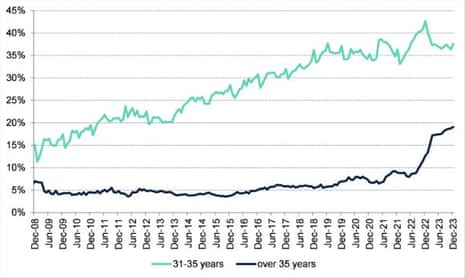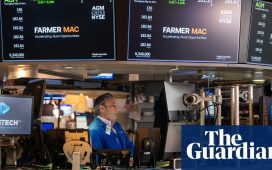Introduction: Hunt announces £360m manufacturing funding package in growth push
Good morning, and welcome to our rolling coverage of business, the financial markets and the world economy.
As budget week begins, the British government has announced a new investment package to help make the UK “a world leader in manufacturing”.
Worth a combined £360m from government and industry, the funding will support R&D and manufacturing projects in sectors where the UK is – or could be – world-leading, by unlocking investment from the private sector.
It includes almost £200m for aerospace R&D projects, to develop energy-efficient and zero-carbon aircraft technology needed to achieve net zero aviation.
There’s also £73m of joint funding for “cutting-edge automotive R&D projects” for electric vehicle technology, to make them more efficient and competitive.
The Treasury explains:
Supported by more than £36m of government funding awarded through Advanced Propulsion Centre UK (APC) competitions, this includes four projects which are developing technologies for the next generation of battery electric vehicles, making them more efficient and competitive, led by companies including automotive manufacturers YASA and Empel Systems.
[This comes six months after prime minister Rishi Sunak’s green u-turn, when he delayed banning the sale of new petrol and diesel cars by five years to 2035].
The government is also contributing £7.5m to help two pharmaceutical companies to spend £84m to expand their UK plants; Almac, a pharmaceutical company in Northern Ireland produces drugs to treat diseases such as cancer, heart disease and depression, while Ortho Clinical diagnostics of Pencoed, Wales, produces medical testing products.
The Chancellor of the Exchequer, Jeremy Hunt, says the money will help secure jobs and grow the economy:
“We’re sticking with our plan by backing the industries of the future with millions of pounds of investment to make the UK a world leader in manufacturing, securing the highly skilled jobs of the future and delivering the long-term change our country needs to deliver a brighter future for Britain”.
The economy certainly needs more investment; last summer, the IPPR think tank warned that the UK is bottom of G7 league table for business investment, leaving the country in a growth ‘doom loop’.
Back in the autumn statement last November, the UK announced £4.5bn to increase investment in strategic manufacturing sectors – auto, aero, life sciences and clean energy.
But Labour’s shadow business secretary, Jonathan Reynolds, isn’t impressed by today’s announcement; he says the government is “incapable of providing the long-term stability manufacturing needs to thrive”.
Reynolds added:
“Recycled announcements won’t be enough to turn around the lowest business investment in the G7.”
The funding announcement comes as Hunt puts the finishing touches to Wednesday’s budget, with Tory MPs pushing the chancellor to produce some voter-pleasing tax cuts.
But is 1p, or more, off income tax really what people want, given the state of UK public services?
An opinion poll of almost 5,000 people across Britain released by the Joseph Rowntree Foundation (JRF) this morning shows that almost three-quarters were “very worried” or “fairly worried” about funding for the NHS and other public services, compared with less than half who were concerned about tax on earnings.
JRF are warning Hunt that his budget risks condemning Britain to a second “lost decade” for living standards.
Hunt himself said yesterday he wants to move Britain towards becoming a lower-tax economy, “as and when we can afford it”….
Key events
Apple vows to appeal EU fine
Apple has claimed that the EU has failed for find any “credible evidence” that consumers have been harmed.
In a hard-hitting response to today’s fine, Apple also insists it has played a key role in Spotify’s success, saying Europe’s digital music market is thriving.
Apple also accuses the Swedish streaming company of working with the European Commission on “an investigation with little grounding in reality”.
The US tech company says:
Today, the European Commission announced a decision claiming the App Store has been a barrier to competition in the digital music market. The decision was reached despite the Commission’s failure to uncover any credible evidence of consumer harm, and ignores the realities of a market that is thriving, competitive, and growing fast.
The primary advocate for this decision — and the biggest beneficiary — is Spotify, a company based in Stockholm, Sweden. Spotify has the largest music streaming app in the world, and has met with the European Commission more than 65 times during this investigation.
Today, Spotify has a 56 percent share of Europe’s music streaming market — more than double their closest competitor’s — and pays Apple nothing for the services that have helped make them one of the most recognisable brands in the world. A large part of their success is due to the App Store, along with all the tools and technology that Spotify uses to build, update, and share their app with Apple users around the world.
We’re proud to play a key role supporting Spotify’s success — as we have for developers of all sizes, from the App Store’s earliest days.
Apple adds that the facts simply don’t support this decision, adding “as a result, Apple will appeal”.
Apple also accuses the EU of having tried to build “three different cases” against it. But each one, it claims, found no evidence of consumer harm or of anti-competitive behavior.
Apple says:
Eight years of investigations have never yielded a viable theory explaining how Apple has thwarted competition in a market that is so clearly thriving.
Q: You’ve explained that European consumers have been ripped off for a decade, for as long as Spotify has existed. Will there be any conpensation paid?
Vesteger agrees that consumers have indeed paid too much, or not even been able to find what they were looking for, due to Apple’s anti-steering system.
She suggests consumers could have paid two or three euros per month more, because of the restrictions on music streaming apps’ abilities to tell consumers about cheaper offers outside the App Store.
However, it’s not within the framework of EU competition law to order compensation, she adds.
Q: Where does the money go?
The €1.84bn fine will go into the Commission’s budget, and eventually returned to member countries by lowering their budget contributions, Vesteger says (unless it is successfully appealed).
The lump sum portion of Apple’s fine is worth €1.8bn, Margrethe Vestager, underlining her point that without it, the penalty would have been very small.
The Apple fine would have been quite small, @vestager says, noting it would have been a mere parking ticket for a company that size.
So she ramped it up with a “lump sum” to make sure it was proportionate to a company that size.
1.84 billion is a chunky amount. /1
— Lewis Crofts (@lewis_crofts) March 4, 2024
Vestager says the EU will be watching closely that Apple complies with today’s ruling.
Antitrust competition chief Margrethe Vestager is taking questions from reporters now.
Q: €1.8bn is a large amount – clearly you tried to get it to a level where people at the top of Apple pay attention. And have you penalised them for supplying inaccurate information, as today’s ruling suggests has occured?
Vestager says the fine has two elements, including a lump sum to ensure the penalty has enough weight.
She explains that the standard penalty from the EU’s usual guidelines only came to a level comparable to “a parking ticket”. So she has also turned to EU rules which allow a lump sum to be added, to create a deterrant.
It’s the first time this has occured in this sort of case, Vestager suggests, explaining that it has been used before in cartel cases.
The total fine is just 0.5% of Apple’s annual worldwide turnover, she adds.
Today’s €1.84bn fine reflects Apple’s financial power, and the harm its behaviour inflicted on millions of European users, Margrethe Vestager tells reporters in Brussels.
As well as the fine, the EC is ordering Apple to stop preventing music-streaming apps from informing users of cheaper deals away from its App Store.
Vestager: Apple abused its dominant position
EU competition chief Margrethe Vestager is announcing Apple’s €1.8bn fine in Brussels now.
She explains that Apple had imposed unfair trading conditions, by preventing music-streaming apps from informing users of cheaper deals away from Apple’s App Store.
Vestager says:
“For a decade, Apple abused its dominant position in the market for the distribution of music streaming apps through the App Store.
They did so by restricting developers from informing consumers about alternative, cheaper music services available outside of the Apple ecosystem.”
EU fines Apple €1.8bn over streaming restrictions
Newsflash: Apple has been fined €1.84bn by the EU following an investigation into restrictions imposed by its app store on music streaming providers such as Spotify.
The European Commission, the EU’s executive arm, imposed the punishment after finding the iPhone maker had broken competition law by imposing curbs on app developers.
The investigation, launched following a complaint from Spotify, focused on a restriction that prevented developers from telling iPhone and iPad users about cheaper music subscriptions that are available outside the App Store.
Spotify has argued that the restrictions benefit Apple’s rival music streaming service, Apple Music.
More to follow….
BREAKNG Apple fined €1.8bn euro for anti competitive practices regarding Spotify.
— Lisa O’Carroll (@lisaocarroll) March 4, 2024
First-time buyers turn to longer mortgages

Kalyeena Makortoff
UK lenders have reported another surge in 35+ year mortgages, as first-time buyers were forced to borrow into retirement to secure affordable monthly payments.
Previous generations tended to borrow over a 25-year term, but higher interest rates have been forcing borrowers to take out much longer loans.
According to lobby group UK Finance, one in five first-time buyers took out a 35-year mortgage in the fourth quarter of 2023, compared to less than one in ten a year earlier. That is the highest since at least 2008, its figures show.
It suggests that home ownership still remains out of reach for many, despite the longest-possible mortgage terms.
Eric Leenders, managing director of personal finance at UK Finance, said:
“2023 was a tough year for UK households and we expect to see continued challenges in 2024. Affordability remains a barrier to home ownership, but pressures should start to ease gradually through this year and next.
“Amidst ongoing cost challenges, it’s encouraging that customers don’t look to be running up higher levels of unsecured debt. But we know some households will be more affected than others – if you are struggling with personal loan, credit card or mortgage repayments, please reach out to your lender as soon as possible for help.”

Chancellor Jeremy Hunt has repeated this morning that he wants to cut taxes, but in a “responsible way”.
Echoing comments he made yesterday, Hunt says the countries around the world which are growing fastest have lower taxes “because that makes a more dynamic, more energetic, more entrepreneural economy”.
Speaking to broadcasters at Siemens’ UK factory today, following the announcement of £100m investment to secure 800 jobs, Hunt says:
We do want to move to a lower-taxed economy, but we’re only going to do so in a way that is responsible and recognises that there are things that taxes pay for, [and] that we couldn’t cut taxes by borrowing.
We’ll do so in a responsible way.
If the goverment can run public services more efficiency, that will mean less pressure on taxpayers, he adds.
Q: You’re reportedly planning to clamp down on non doms… why are you pinching Labour policies?
Hunt says that we will have to see “precisely” what he announces on Wednesday, and adds that the government is “laying the foundations for long-term growth”.
Our Politics Live blog is tracking the latest developments ahead of Wednesday’s Budget, including research showing that the richest households will benefit 12 times more than the poorest if the chancellor cuts national insurance by 2p.
Back in the markets, European stocks have nudged a new record peak this morning.
The Stoxx 600 index has crept slightly higher this morning, to 497.81 points, putting 500 points in sight for the first time.
The index has been lifted by strong demand for tech shares, helped by the artificial intelligence boom, and hopes for interest rate cuts this year to support Europe’s economy.
Treasury minister Bim Afolami has been doing the media rounds this morning, touting the government’s focus on productivity.
Afolami says this includes £800m package of technology reforms designed to free up time for frontline public sector workers, and improve public services, announced last weekend.
This includes using artificial intelligence to speed up MRI scan times, so people get their diognosis faster.
These sort of investments lead to better results, Afolami says, adding:
“It’s not about how much money you put in, it’s actually about what you get out”.
‘People want better results from their public services’
On reports the chancellor is considering cuts to public spending at the Budget, Treasury Minister @BimAfolami says the focus is on productivity – ‘it’s not about how much money you put in, it’s about what you get out’ pic.twitter.com/ypLDDho5Kp
— ITV News Politics (@ITVNewsPolitics) March 4, 2024
UK R&D funding push: What the experts say
UK manufacturers are welcoming the government’s £360m funding package to support research and development at UK factories.
Stephen Phipson, chief executive of Make UK, says:
“Industry will welcome this announcement as yet another boost for key sectors that will put advanced manufacturing at the heart of the UK’s economic future.
These industries will be key to addressing many of the societal challenges we face in a competitive world and highlight what can be achieved with a constructive dialogue between Government and business. Taken together they are another piece in the jigsaw of a modern industrial strategy to make the UK a world leader in key sectors of the future.”
Steve Smith, managing director at Alvarez & Marsal Tax, says :
“The reported inclusion of a £360m funding package in Wednesday’s budget would be a timely and much-needed boost for British businesses, particularly those in the aviation and EV industries.
“These sectors are vital for maintaining long-term productivity, so funding is especially welcome considering that the skills agenda has been somewhat overshadowed in budget discussions up to now, often taking a backseat amidst the chatter about individual tax cuts.
KPMG fined £1.5m for ‘serious failings’ in M&C Saatchi audit
KPMG has been fined almost £1.5m by the UK’s accounting watchdog for “basic failings” in its audit of advertising company M&C Saatchi plc in 2018.
The Financial Reporting Council (FRC) fined KPMG after concluding it had not conducted the audit with sufficient professional scepticism when assessing “work in progress” credits which had lifted M&C Saatchi’s revenues.
They also failed to properly audit journal entries, or show sufficient “professional scepticism” when assessing whether the ad agency was right to retain rebates which should have been passed back to clients.
The FRC launched its investigation after M&C Saatchi’s discovered accounting errors in 2019, which led to its 2018 profits to be restated. It also released two profit warnings which hammered its share price.
It had decided to fine KPMG £2,250,000, which has been reduced to £1.46m after it admitted its errors.
Adrian Wilcox, KPMG’s audit engagement partner, has been fined £75,000, reduced to £48,750.
Claudia Mortimore, the FRC’s deputy executive counsel, says:
“KPMG’s audit did not meet the required quality standards in a number of respects amounting to serious audit failings and breaches of audit standards. This included a lack of professional scepticism in certain high-risk areas of the audit and basic failings in journal testing.”
There are reports today that the chancellor could crack down on holiday lets to raise money to fund tax cuts on Wednesday.
Jeremy Hunt could scrap the furnished holiday lets (FHL) regime, which gives tax reliefs on properties being rented out for holiday-goers.
The chancellor “hunts” down those holiday letting in the hope of flushing out the short term in favour of the long term by scrapping tax perks. This £300m tax raid affects approximately 127,000 properties that currently benefit from the regime @thetimes @ShippersUnbound pic.twitter.com/DP5NlwzL7Q
— Emma Fildes (@emmafildes) March 3, 2024
And new data from the Office for National Statistics shows that nearly 2.8m stays in short-term lets were booked in July-September last year, through Airbnb, Booking.com and Expedia Group, or almost 29m ‘guest nights’.
Over 63% of those bookings were made by domestic visitors, with the most guest nights in Cornwall (at 1,586,060), followed by Edinburgh (1,157,180) and Westminster (871,900).
This map shows the situation across the country:
Allow content provided by a third party?
This article includes content hosted on ons.gov.uk. We ask for your permission before anything is loaded, as the provider may be using cookies and other technologies. To view this content, click ‘Allow and continue’.











